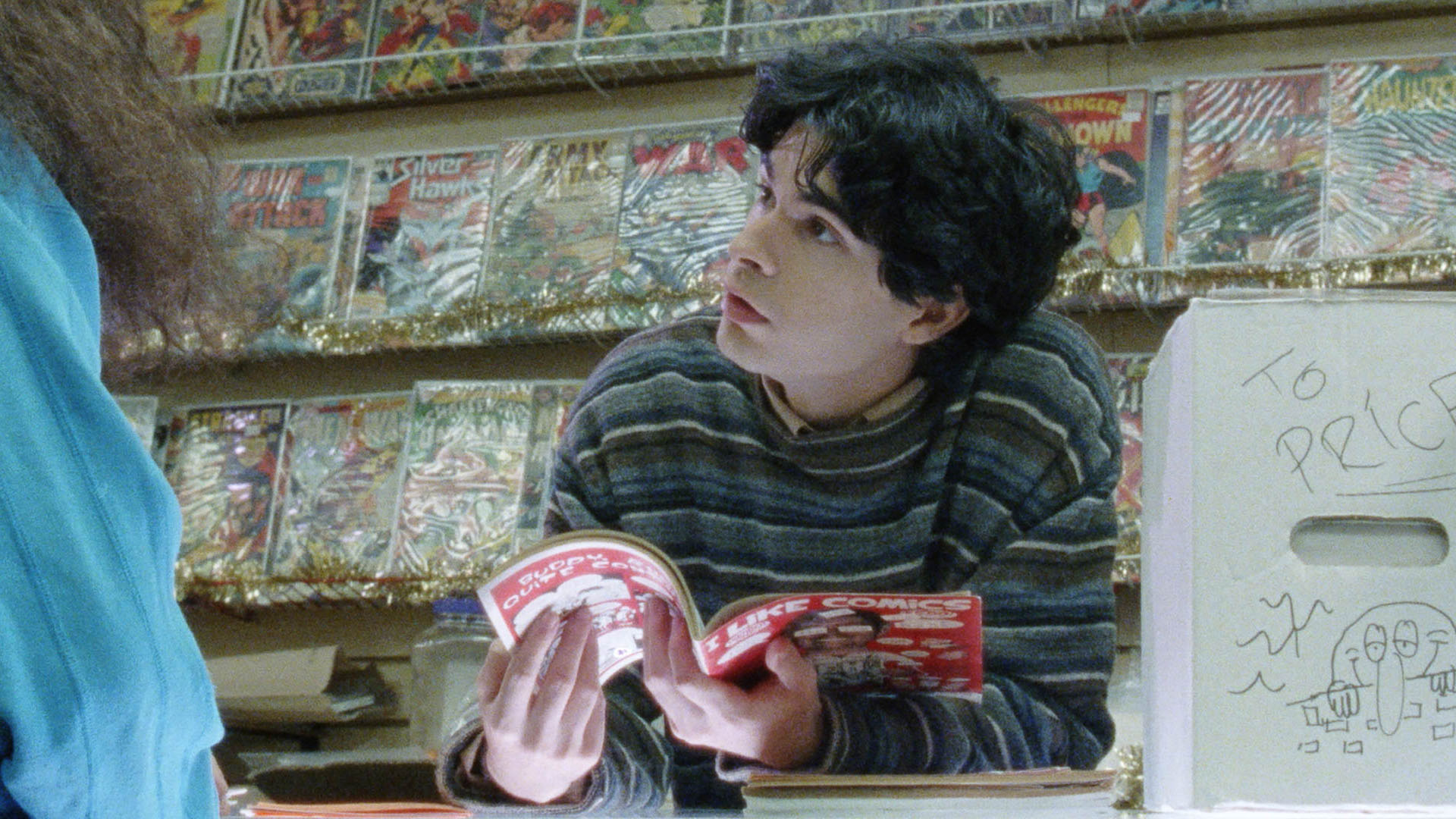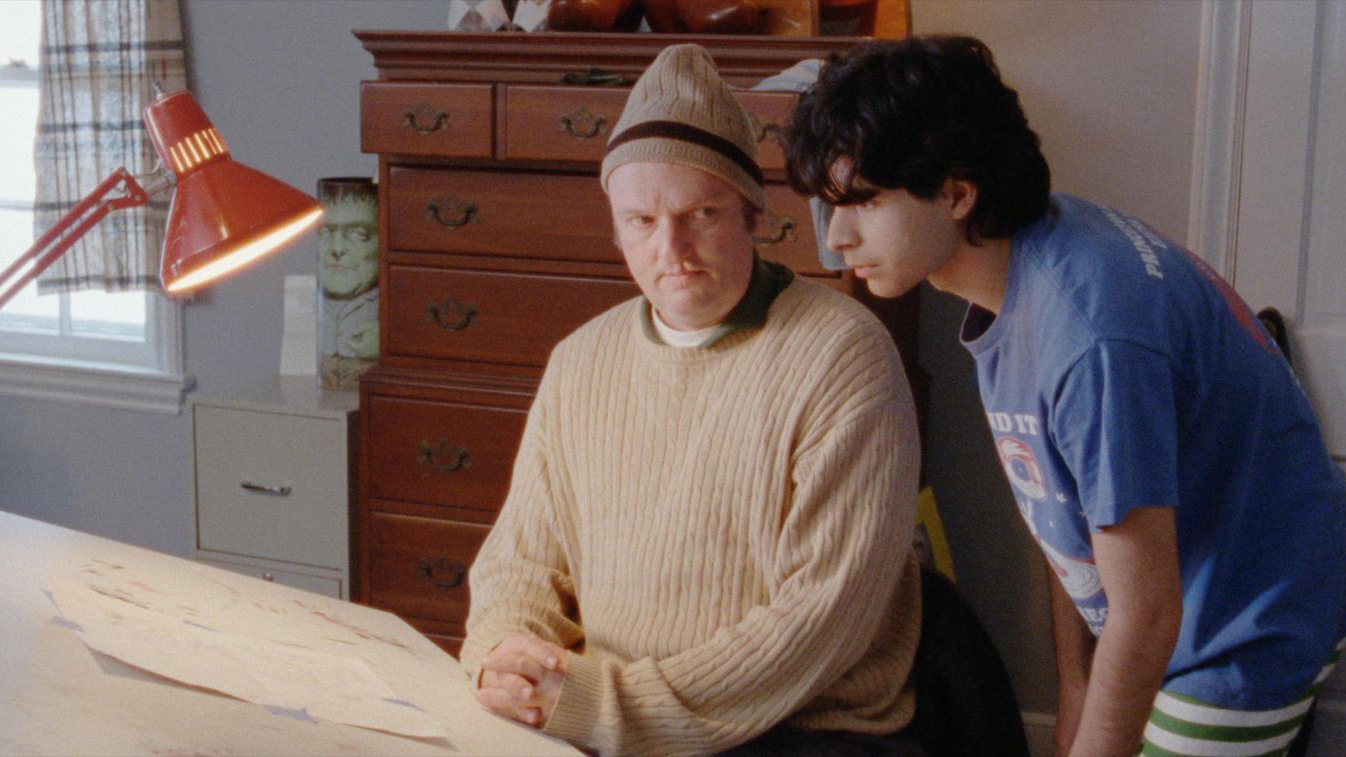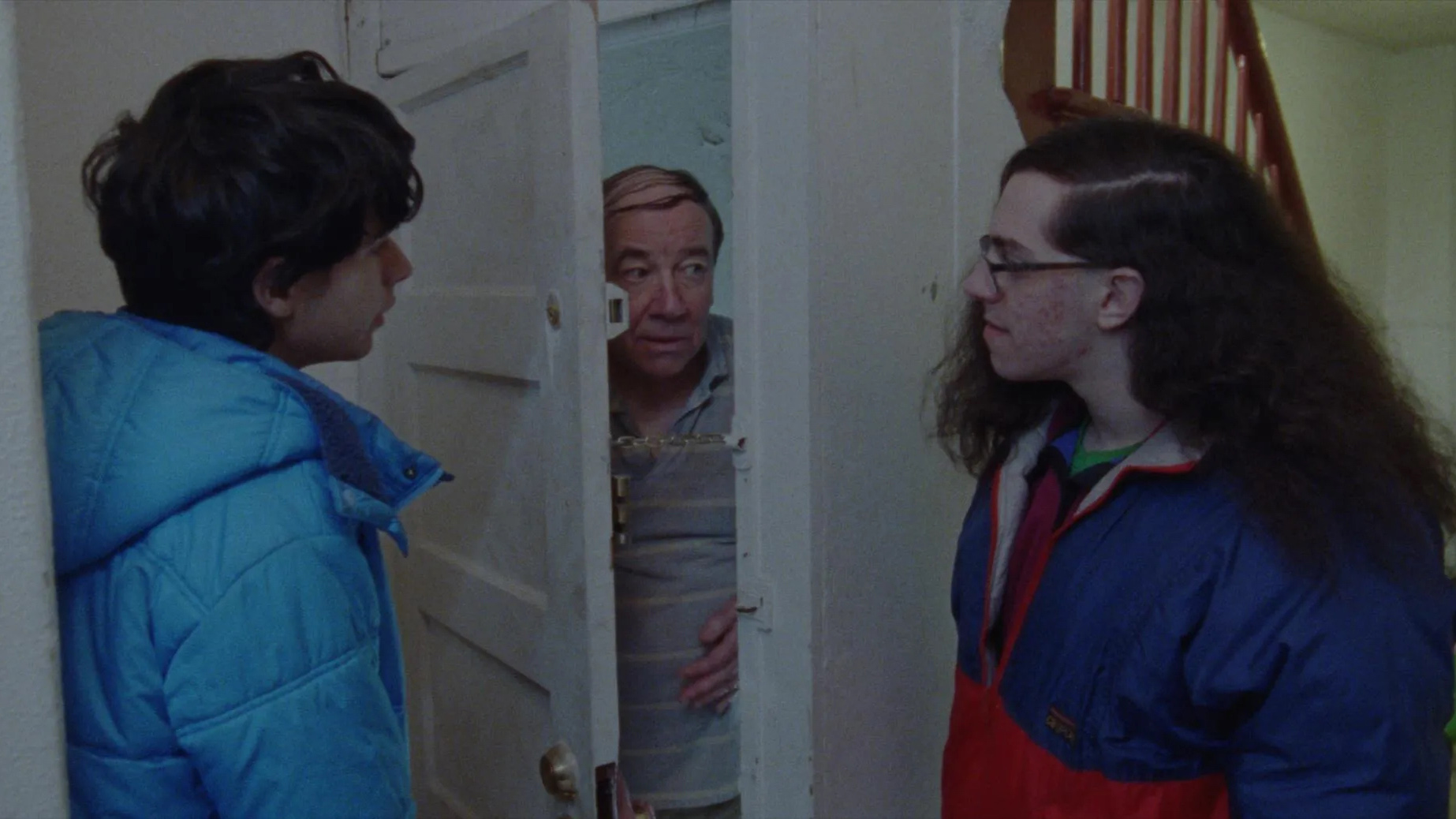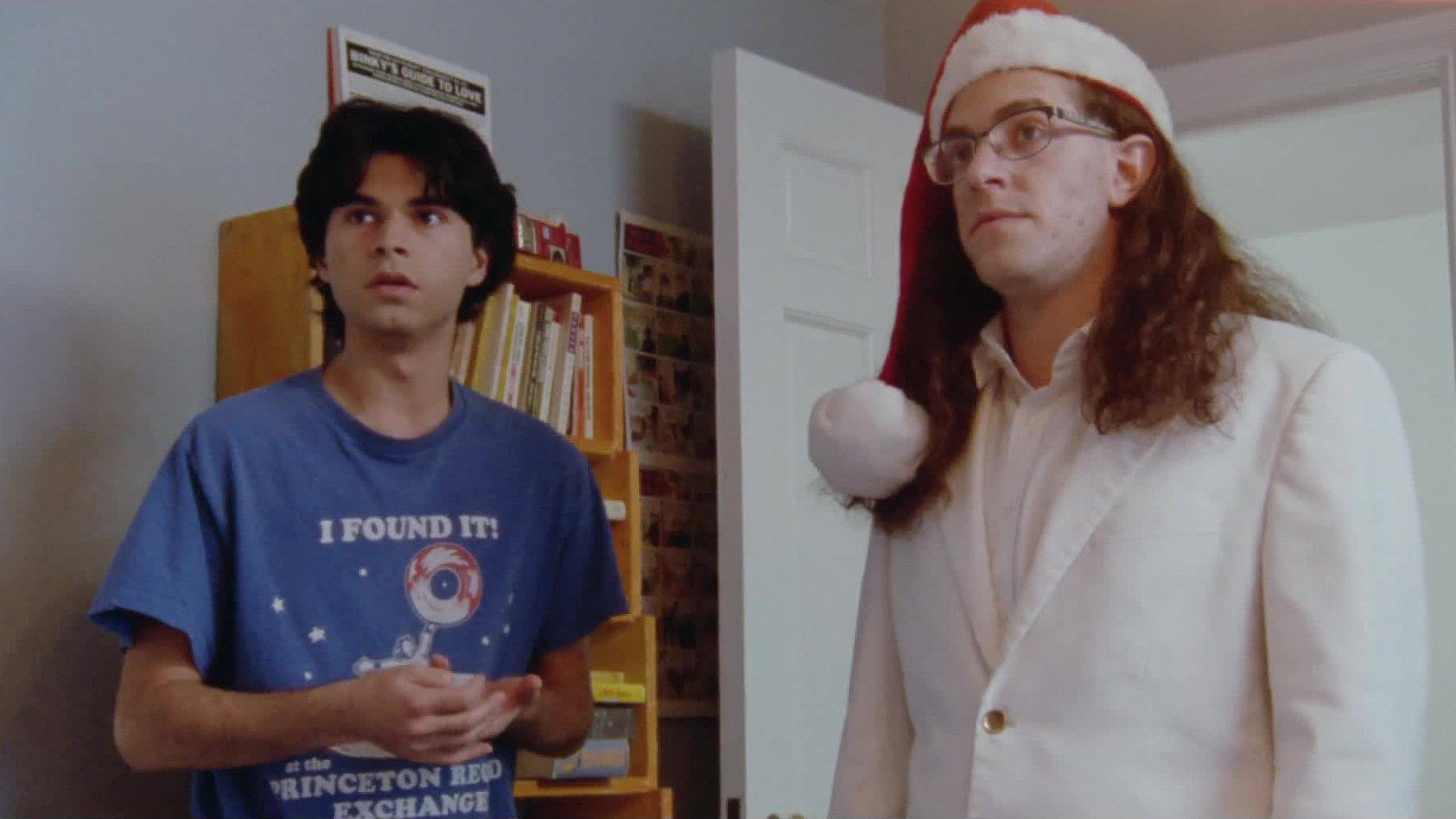Funny Pages – Four Ways

The live-editing workshop is an integral part of each year’s Critics Campus, and this year, four members of the cohort were assigned Owen Kline’s coming-of-age black comedy Funny Pages. After penning their reviews, the participants sat through an intensive revision session with Fireflies Press co-publisher and Metrograph editor Annabel Brady-Brown. Read their final reviews below.
———
By Andrew Fraser
Artists are insufferable, which is news to exactly no-one.
Robert (Daniel Zolghadri) knows this is true, and he doesn’t care. In fact, being insufferable is mandatory in his ambition to become a serious cartoonist. “Always subvert,” says his mentor Mr Katano (Stephen Adly Guirgis), dispensing advice while stripping naked in front of his underage student – a provocation in how far Robert is willing to go for his art. This impales his psyche and motivates Robert to defy his WASPy parents (Maria Dizzia and Josh Pais) and leave home to cosplay as a rough-edged Male Genius™. It doesn’t take long for Robert to discover that the struggle is real, not just something you can mine for the panels of a comic book.
Funny Pages, the debut from writer/director Owen Kline, is a dirty piece of work – quite literally, in that almost every surface in the film feels in desperate need of some Ajax. Sweat stains, spittle, acned skin and, occasionally, blood seep across the frame, bringing to vivid life the transgressive cartoons Robert seeks to emulate. Shot on speckled 16mm by Sean Price Williams and Hunter Zimny, both collaborators with Funny Pages’ producers Josh and Benny Safdie, the film embraces a crude 90s slacker vibe that helps establish its bleak comedic tone.
The film is populated with characters that would be at home in a Todd Solondz film, and to whom Robert sees himself as separate. He’s diFfereNt – misunderstood by his parents, bored at school and only barely concealing his contempt for his loveable best friend Miles (Miles Emanuel), who appears to be infatuated with Robert…’s comics. The lone person Robert respects is Wallace (Matthew Maher), an unhinged ex–colour separator for one of his favourite comics publishers. This collision with Wallace leads Robert on an Orphean descent to the underworld (New Jersey).
Funny Pages is most compelling when it taps into the male anxiety of not feeling special. Kline, the offspring of Hollywood couple Kevin Kline and Phoebe Cates, may have found inspiration from the unique set of expectations that arrive from the blessing or curse of being a nepo baby. “You don’t just get to be an artist!” Wallace shouts during the film’s chaotic climax, disrupting Robert’s naive ambitions.
Throughout the film, men are plagued by the omnipresent threat of failure, unable to accept that a desire to be great isn’t enough to actually be great. Kline approaches this realisation with a compelling mixture of misanthropy and adoration, and he presents his collection of testosterone-fuelled weirdos with fetishistic affection – like the comics that own Robert’s heart and mind.
Funny Pages builds to a haywire final act involving a long-winded slapstick set piece. This jeopardises the film’s more perceptive observations on male fragility, as the comedic stunt sequence spotlights Kline’s preoccupations with broad comedy without space left for emotional resolution. Your inclination towards Funny Pages may rest on your tolerance for artists torturing themselves and others, but, if you recognise the masochistic urges of the artist, there is pleasure in the pain.

Funny Pages
By Ellen O’Brien
Dicks fly everywhere in the opening of Funny Pages, writer/director Owen Kline’s feature debut. Shlongs are sketched out in comics, whose pages flip in the hands of our teenage protagonist, Robert (Eighth Grade’s Daniel Zolghadri). Within the film’s first minutes, during an after-hours tutoring session, his seedy art teacher/mentor Mr Katano (Stephen Adly Guirgis) strips down to his gym socks, appendage out and ready to be captured by Robert’s fledgling artistry. And, as is revealed through the course of the film, Robert is a bit of a dick himself. He distances himself from his shamelessly middle-class parents and his best friend Miles (Miles Emanuel), dropping out of high school and turning instead to poor and marginalised figures he sees as peers, whom he hopes will endow his own comics with greater spirit.
Robert works in a comic-book store, filled with its own crew of misfits whose speech is laden with references to underground and classic comics. He also has a collection of his own, including rare pornographic Tijuana bibles. It’s clear that Funny Pages’ creators fetishise the funnies. Kline studied illustration at Pratt Institute in Brooklyn, while producers Josh and Benny Safdie (best known for directing Good Time and Uncut Gems) often cite crude and controversial underground comics artist Robert Crumb as an inspiration. Crumb and his peers drew sexually explicit cartoons and were defenders of uncensored self-expression, a belief that Katano drums into Robert. For Robert, ‘self-expression’ means moving away from his parents’ neighbourhood into a dank apartment in Trenton, New Jersey, and surrounding himself with weirdos and oddballs.
But both Robert and Funny Pages do not seem to align with counterculture as much as they think they do. By the end of the film, Robert is more like his parents than his comics-artist heroes. Similarly, Funny Pages seems to think it is being subversive, with its vulgar perspective and gritty, 16mm aesthetic, but feels more in step with Robert’s angsty-white-boy perspective. For instance, both are more interested in the rough side of town and its inhabitants than with Robert’s suburban home in Princeton, but the downtrodden that Robert mixes with are portrayed in a kind of detail designed to provoke squeamishness. Wallace (Matthew Maher), a former colour-separator for the reputed publisher Image Comics who becomes the object of Robert’s obsession, is first introduced while frantically scrubbing his body in the bathroom of his public defence lawyer. Maher spent his early career portraying disturbing side characters in procedurals – including a memorable stalker nicknamed the “Wiener Man” on Law & Order: Special Victims Unit – and the actor channels a similarly unsettling spirit here.
While Kline also pokes fun at Robert’s naivety, it’s approached slightly differently: more teasing the protagonist rather than the ‘point and laugh’ situation that occurs with side characters. Some of the biggest laughs at the festival screening came during intimate moments with the eccentric ensemble and felt more aimed at, rather than with, the subjects, even though the true humour of the film could be found in Robert’s clumsiness while mixing with people outside his usual sphere.
When a film dedicated to outcasts feels like it is caricaturing its subjects rather than truly inhabiting their world, a little more work is required to make clear the butt of the joke. Perhaps Kline might mimic Crumb’s tactics, brushing off critiques by suggesting that detractors can’t grasp satire. In this case, the ridicule of Robert is understood but is overshadowed by the lack of care taken with the other targets of Kline’s jibes.

Funny Pages
By Lamya Nawar
Funny Pages opens with our teenage cartoonist Robert (Daniel Zolghadri) sifting through a portfolio of crudely sexual comic strips. His art teacher, Mr Katano (Stephen Adly Guirgis), is challenging Robert to be more experimental with his art, proposing a bold solution to test his limits: Would Robert draw him naked, perhaps? Show his potential as an artist right then and there?
Robert is so dedicated that he agrees. But, as he starts to outline Katano’s flaccid penis, the weirdness of the situation starts to sink in. He makes an excuse to leave, but Katano tracks him down, drawing up in his car and offering him a lift home. Robert nervously declines – and a large incoming truck slams into Katano’s car.
From this moment, it is clear Owen Kline’s directorial debut will not be treading the well-worn path of uplifting coming-of-age comedies. Rather, Robert regresses. At the start, he is strong-minded about developing his craft at college, even as Katano derides institutions as killers of creativity. But, after Katano’s death, Robert becomes desperate to hold onto his presence and internalises his former mentor’s anti-establishment values about artmaking. Robert drops out of high school, leaves his parent’s suburban abode, and moves into an airless, muggy basement, shared with two middle-aged men.
The influence of the Safdies – who serve as producers here – is omnipresent. Similar to the brothers’ 2019 film Uncut Gems, Funny Pages does not concern itself with tonal balance, instead forcing the audience to sit with an abject discomfort for its entire 86-minute run – a feeling that increases with every weird, slimy situation that Robert finds himself in. The youthful zeal with which Robert chases his dream is embodied in the cinematography of Sean Price Williams (a regular Safdies collaborator) and Hunter Zimny. Extreme close-ups force attention on the fantastic ugliness of the adults in Robert’s life, zooming into their pores, sweat and receding hairlines to present a caricaturist’s view of the world, much like Robert’s own.
Eventually, Robert affixes himself to an unstable, blustering blow-in who is reluctant to mentor him – until the offer of cash is on the table. This is Wallace (Matthew Maher), a client with pending assault charges at the law firm where Robert has found himself a part-time gig as a typist. Despite Robert’s tunnel-vision persistence, their relationship is at best an uneasy alliance, offering little fruitful growth for either of them. Unsurprisingly, mayhem follows.
Despite some daring narrative moves, Kline hits a dead end in the final act. The eccentricity of his characters is wasted on a slapstick routine, which sees the story devolve into a black-comedy skit that has little relevance to the broader themes of idolisation, insecurity and artmaking. As Robert sits alone amid shelves of comics, Funny Pages offers little closure – only a deep-seated cynicism.

Funny Pages
By Brooke Heinz
“Always subvert expectations.” This is the advice given to Robert (Daniel Zolghadri) by his art-teacher-cum-mentor when encouraging the high schooler’s ambitions of making it big with his Robert Crumb–esque comics. Unfortunately, Funny Pages itself shows why this advice might not always be the best for newcomers. With a confidence that occasionally veers into arrogance, debut writer/director Owen Kline confuses subversion with substance in this attempt to disrupt the feel-good coming-of-age status quo.
Following the sudden death of his mentor, Robert abandons both his education and home, picking up a job in a public defender’s office to make ends meet. When he discovers that one of the clients, Wallace (Matthew Maher), once had a minor position in the comics industry, Robert pursues him to be his new guiding figure. The problem is, Wallace isn’t interested.
The idea of using an unreciprocated mentor–mentee relationship to anchor a coming-of-age story has plenty of emotional and philosophical potential. Although Kline does touch on interesting ideas like the dangers of idolisation, he brushes away these thoughts as quickly as he raises them.
Instead, Robert and Wallace’s relationship is a static, exhausting experience. Kline’s stubborn refusal to let either Wallace or Robert grow makes their unrequited dynamic wear thin quickly. Quarrels are often propelled by Wallace’s mood swings between begrudging cooperation and angry outbursts, the extremity of which can feel confusing in the moment. Fortunately, Maher’s portrayal has a much-needed empathy and provides glimpses of his thought process – his constantly scanning eyes and measured consideration before each action suggest repressed trauma behind his hypersensitivity.
Harder to sympathise with is Robert, whose cockiness persists without introspection even after Wallace’s reprimands. Kline challenges audiences to stand by Robert in his teenage angst and hubris even when he belittles those around him without a care. Particularly difficult to defend is his undermining of best friend and fellow aspiring comics writer Miles (Miles Emanuel), fully on display when Robert gleefully ropes in another comics fan to humiliate Miles for taking cues from another work.
Given this scene, it’s ironic how proudly Kline wears the influence of Funny Pages’ producers the Safdie brothers. Benny and Josh Safdie have built a reputation for crafting unlikeable and morally stagnant protagonists in films such as Good Time and Uncut Gems (though, in an important distinction, with a more self-aware eye than Kline’s).
Good Time cinematographer Sean Price Williams (alongside Hunter Zimny) brings with him the frequent, handheld close-ups that have characterised the Sadfies’ recent output, putting us closer than often comfortable. The sweat-slicked combover of Robert’s landlord, the acne of adolescent skin, even the texture of comic-book pages and sketching paper: these magnified details, instilled with an extra dose of nostalgia thanks to the use of 16mm film, make the world and supporting characters feel more lived-in.
But all this isn’t enough. With humour that can teeter towards condescension, it prompts the question: why should we care and why are we laughing?